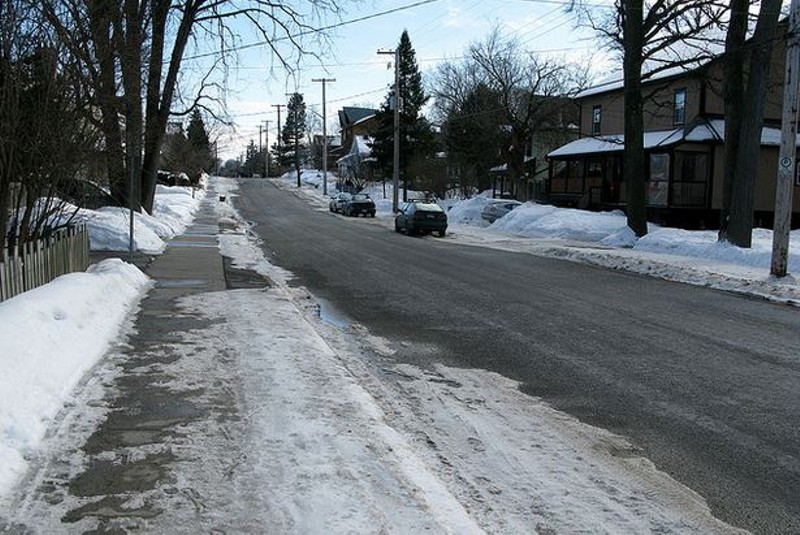
Flickr via Douglas Sprott
That's how St. Louis Post-Dispatch columnist Bill McClellan concluded his column about LaDonte Gaines-Gracy. (The February 1 piece is, sadly, trapped behind the Post-Dispatch's paywall.) McClellan had attended Gaines-Gracy's trial in Jennings Municipal Court. He watched the 21-year-old take a deal offered by the prosecution, opting to plead guilty to littering rather than going to trial to fight charges for resisting arrest, assaulting a police officer and walking in the street.
McClellan was clearly disturbed by what he'd witnessed. Gaines-Gracy, a high school graduate who made his living by caring for a disabled great-uncle, had been stopped by a Jennings police cruiser on February 14, 2014. The stop ended with the officers slamming Gaines-Gracy to the ground, tasing him twice and placing him under arrest.
“The whole situation could have been defused with a little cooperation," Ethan Corlija, the Jennings prosecutor, told McClellan. Later, Corlija said, "I don't see any abuse here."
But that's not how Gaines-Gracy sees it. In a federal civil rights lawsuit filed earlier this month, he and his attorneys allege that the two officers turned what should have been a brief, peaceful interaction into a violent showdown.
After he was stopped, Gaines-Gracy told the officers that he was walking in the street because recent storms had covered the sidewalk in snow and ice. (The police report notes that Gaines-Gracy was walking "in the middle of the street." The lawsuit describes him walking "on a part of the street that was plowed...against traffic and reasonably close to the curb.")
Peter Fiore, one of Gaines-Gracy's attorneys, tells Riverfront Times that his client broke no law by walking in the street. Indeed, the Jennings municipal statute that prohibits walking on a roadway also includes this subsection:
Where sidewalks are not provided, any pedestrian walking along and upon a highway shall, when practicable, walk only on the left side of the roadway or its shoulder facing traffic which may approach from the opposite direction.
Yet the encounter between Gaines-Gracy and the officers quickly turned ugly.
The police report includes detailed descriptions of Gaines-Gracy's body language: It notes how he "squinted his eyes, jerked his neck back" when an officer asked if he had any form of identification. Gaines-Gracy told the officers his first name was 'D' and his last name was 'GG.' After he refused to provide an ID or Social Security number, the officer asked him to remove his hands from his pockets. Gaines-Gracy complied.
The police report continues, painting an even more menacing picture of Gaines-Gracy's "offensive posturing."
I informed Gaines-Gracy that if he did not properly identify himself with his real name...I would be required to arrest him for the pedestrian violation. Again, Gaines-Gracy stated that he was tired of getting harassed by the police, and that he was not going to tell me his name. It should be noted that after Gaines-Gracy made this statement, he stepped back with his right foot, resembling a boxer's stance.
The officers told Gaines-Gracy he was under arrest and ordered him to turn around and put his hands behind his back..Gaines-Gracy reportedly said, “Man, I am tired of y’all doing this. I ain’t even do nothing.”
What followed was a scuffle. Gaines-Gracy reportedly jerked away from one of the officers and pushed him in the chest with both hands. When Gaines-Gracy turned to escape, he was tackled by both officers, dragged to the ground and was tased twice.
After his arrest, police checked Gaines-Gracy's criminal record. It showed no active warrants. His charges, in addition to walking in a roadway, included resisting arrest and assaulting an officer.
Of course, in the end prosecutors dropped those charges in exchange for pleading guilty to "littering."
The civil rights lawsuit seeks undetermined compensatory and punitive damages, as well as medical and attorney fees. The officers, the lawsuit alleges, violated Gaines-Gracy's rights under the Fourth and Fourteenth Amendments. The city of Jennings is accused of failing to adequately train and discipline its officers.
"Think of how different this could have been," Fiore says. "Think of these officers stopping this kid, and he says, 'I'm just going home,' and they say, 'It's cold outside, hop in. We'll give you a ride.'"
Follow Danny Wicentowski on Twitter at @D_Towski. E-mail the author at [email protected]





